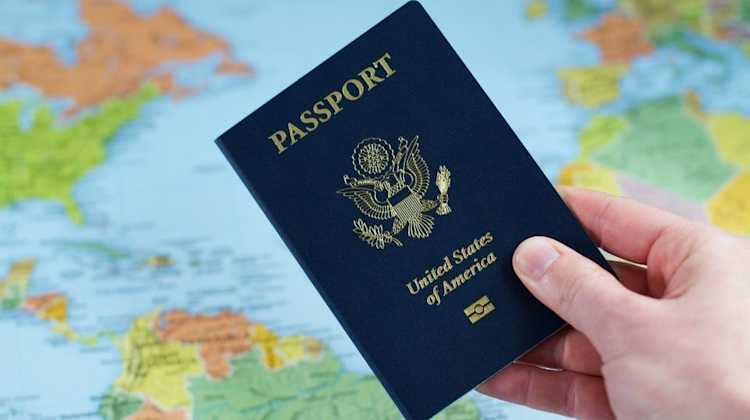Military Teen Voting with NMFA
by Lizann Lightfoot - September 16th, 2022
Moving makes voting challenging, especially for military teens.
What is the Military Teen Voter Initiative?
Kate: We recognize that the process of registering to vote after a PCS move can be complicated, even for adults who have voted before. We wanted to make the process easier for military teens and first-time voters, and to add some excitement over this civic duty and getting your voice heard. So we reached out to NMFA to partner with this project.
Why is military teen voting so important?
Raleigh: At NMFA, we really love America! We love serving and supporting families. For us, voting is so important, because it gets our voices heard as military family members. We’ve been long-time partners with AFI on the Military Vote initiative. We’ve been working with teens for the past few years. We partnered with Bloom: Empowering the Military Teen, and we have done surveys for two years and learned so much about teens. 40% of our military teens plan to join the military. You don’t have to wait to start serving America! You can start that now as a voter.
What is a Home of Record for a military voter?
Kate: We have some great resources on MilitaryTeenVoter.com which is a hub of information. Your home of record as a military teen may be a choice for you. You can vote where your parents live, or vote local to where you live now.
Learn more about how to vote after PCS moves here.
If my family is stationed in California, and my parents are registered in Texas, where do I vote?
Kate: You get to choose. You can become a California resident and vote there, or you can register where your parents are, in Texas. This is a unique situation that civilian families don’t have. It can’t just be any base where you have been stationed before (unless you are stationed overseas, then you can register at the last house where you lived.) If you got a driver’s license along the way, you do not need to register at the same state with your driver’s license.
Raleigh: Military kids have to weigh all these unique situations and challenges. You may not be invested in the community where you are living right now. So you want to have conversations about what communities you want to get involved in.
Where do I go to register?
Kate: There are two options. If you are going to vote locally, where you currently live, then go to RegistertoVote.org or MilitaryTeenVoter.com
If you are going to vote in a different state, then we highly recommend that you register with the Federal Voting Assistance Program (FVAP.gov) because they have specific rights and protections for military and overseas voters that you won’t get if you go directly through the state.
We have created a handy flowchart here for military families to explore various scenarios and understand where to vote and register.
If you do a PCS move after registering, what should you do to vote again?
Kate: If you want to vote in the new state, just register to vote in that new Home of Record. If you wanted to maintain residency in the previous state, then you can just request absentee ballots, but you don’t need to do anything new.
When a military teen goes to college, where do they vote?
Kate: Still in their home of record, using an absentee ballot. If your college is out of state, use the Federal Voting Assistance Program because it has extra protections, like automatically prompting you to request an absentee ballot.
Tips for military teens going to college are found in this article.
How do you vote when you move overseas?
Kate: The Federal Voting Assistance Program is a simple post card application form, which completes multiple steps in one form. We recommend you do the federal post card application every year, because then it will register you in your state, and automatically send you absentee ballots to vote.
What is an absentee ballot?
Kate: On Secure Families Initiative.org we have a whole blog post about absentee ballots to explain where it goes. Absentee ballots are just ballots you fill out at home and not in a polling location on Election Day. Some states call it voting by mail, because absentee ballots are sent and returned by mail. It can feel complicated and intimidating, so if it’s that way for us, it is even more so for our teens.
What if the deadline is approaching and I haven’t received my absentee ballot?
Kate: You can contact your local election office. Vote.org has great tools to contact your local office. If you are an overseas voter, you can use that FVAP form, and they start sending ballots in early October. So watch and allow for extra time. There are tools on vote.org to track your ballot.
There is also a federal write-in ballot available at FVAP.org if you get down to the wire and still need to get your vote in.
Are there deadlines for returning ballots?
Kate: Yes. Voter rules and election laws are localized, so there isn’t one nationwide answer. Some states need to be received by the election office by election day. Other allow overseas absentee ballots up to 10 days after Election Day. So check your state’s requirements.
MilitaryTeenVoter.com has an election reminder tool to let you know about smaller, local elections where you are registered. You’ll see Primary deadlines, registration deadlines, etc.
Rapid Fire Round
Where do I go to find information that will be on my ballot?
Kate: Vote411 and BallotReady are two resources we love because they offer non-partisan information about the voting process.
How do I find my poll location?
Kate: Find your polling location on Vote.org.
What do I need to bring with me to vote?
Kate: It depends on your state. Vote.org will have local regulations. Double-check before you leave the house.
Have you ever worked the election polls as a volunteer?
Raleigh: No, but I’m going to do it this year! NMFA believes in the importance of voting in America! NMFA is urging all its employees to volunteer at the polls on Election Day if they feel comfortable. We encourage military spouses and teens to do this too! We are working with Vet The Vote to encourage military families to be involved in voting and volunteering.
Kate: I have never lived where I vote, and you usually need to be a local registered voter to work the polls. But I would love to because it’s a great opportunity to serve the country.
Who is eligible to vote?
Kate: You must be a citizen, at least 18 years old.
When should you register to vote?
Raleigh: You should do it now! September is not too early! Know what the process is, what the requirements are for your ballots, and do it once you arrive at a new duty station.
Words of encouragement for first-time voters:
Kate: You’ve been waiting 18 years to make your voice heard. You have your own opinions, so make them heard at the ballot box, where it really matters. Especially at local elections, one vote can influence the future of your school and community!
Raleigh: America needs you! Go vote because your voice matters, your experience matters, and your opinion matters. Take your kids with you so they see and understand the process. If you’re a teen, don’t feel afraid to ask. Tell a poll worker it’s your first time and you aren’t sure what to do. Don’t be intimidated.
Guests: Raleigh Duttweiler, Director of Outreach at NMFA
Kate Marsh Lord, Communications Director, Secure Families Initiative








